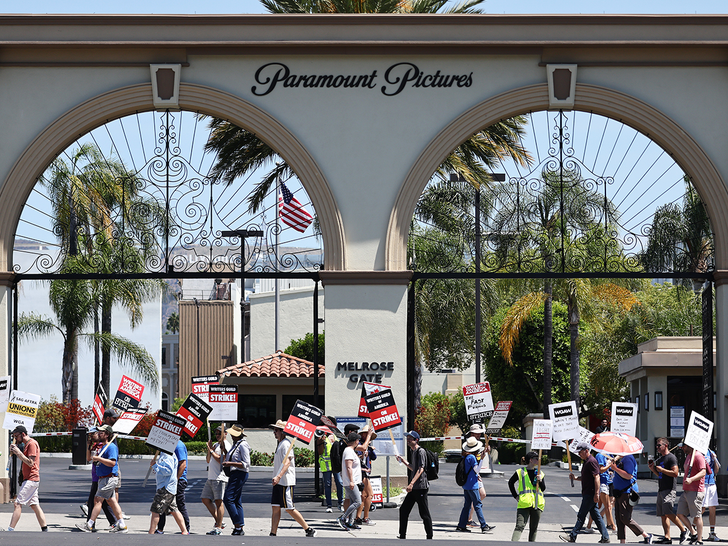Hollywood Shutdown: Actors And Writers On Strike, Impacting Film And Television

Table of Contents
The Reasons Behind the Hollywood Shutdown
The Hollywood shutdown is a result of simultaneous strikes by two powerful unions: SAG-AFTRA (Screen Actors Guild – American Federation of Television and Radio Artists) and the WGA (Writers Guild of America). Both unions are fighting for significant improvements in working conditions and compensation, highlighting deep-seated issues within the industry.
SAG-AFTRA's Demands:
SAG-AFTRA's strike, a significant actor's strike, centers on several key demands. These demands reflect the changing landscape of the entertainment industry, particularly the rise of streaming services and the increasing use of AI.
- Fair Wages: Actors, especially those in television, often receive significantly lower wages than in the past, particularly with the rise of streaming. Many actors struggle to make a living wage even on successful shows. The union is demanding wage increases to reflect the true value of actors' contributions and the increasing cost of living.
- Residuals in the Streaming Era: The traditional system of residuals, payments actors receive each time their work is re-aired, has been severely diminished by streaming services. Streaming platforms often pay a single lump sum, regardless of viewership, significantly reducing actors' income. SAG-AFTRA seeks to reform this system to ensure fair compensation for repeated broadcasts and streaming views.
- Protections Against AI: The increasing use of AI in the entertainment industry poses a serious threat to actors' livelihoods. SAG-AFTRA is demanding strong protections against the unauthorized use of actors' likenesses and performances for AI training and other purposes. They are advocating for explicit consent requirements and fair compensation for AI usage. The fear is that AI could replace actors entirely, leading to widespread job losses.
WGA's Concerns:
The WGA strike, representing the writer's strike, focuses on similar issues but with a particular emphasis on the challenges faced by writers in the streaming era.
- Fair Compensation: Writers are demanding fairer compensation for their work, particularly in the streaming landscape where contracts often lack traditional residuals and payment structures. The success of a streaming show doesn't always translate into financial success for writers.
- Improved Working Conditions: The WGA is fighting for improved working conditions, including better minimum staffing requirements on productions. Often, writers are forced to work longer hours for less pay than previously, affecting their ability to create high-quality work.
- The Issue of Mini-Rooms: The rise of "mini-rooms," smaller writing teams working on individual episodes, has significantly reduced the number of writers employed and decreased individual writer's income. The WGA seeks to increase the number of writers employed on productions to create better working conditions and fair compensation.
Impact of the Hollywood Shutdown on Film and Television Production
The Hollywood shutdown is causing significant disruption to film and television production across the board. The combined SAG-AFTRA and WGA strike has brought many major projects to a standstill.
Production Delays and Cancellations:
The strike has resulted in widespread delays and cancellations of numerous high-profile film and television projects.
- High-Profile Projects Affected: Numerous big-budget films and popular television series have experienced significant production delays or complete shutdowns. The ripple effect impacts ancillary businesses and numerous related projects.
- Ripple Effect on Smaller Productions: The impact extends far beyond major studios. Smaller independent productions are also facing delays and cancellations, impacting many actors, writers, and crew members who depend on these projects for income.
- Financial Implications for Studios: The production halt translates into substantial financial losses for studios and streaming platforms. The longer the strike lasts, the greater the economic damage.
Economic Consequences:
The economic consequences of the Hollywood shutdown are far-reaching and affect numerous sectors.
- Job Losses: Thousands of actors, writers, crew members, and support staff are facing job losses or reduced income. This also affects local businesses that cater to the entertainment industry.
- Economic Downturn in Related Industries: The shutdown impacts industries closely linked to entertainment, such as catering, transportation, and equipment rentals, leading to a potential economic downturn in these sectors.
- Loss of Revenue for Studios and Streaming Platforms: The delay and cancellation of projects translate to significant revenue losses for studios and streaming platforms, potentially affecting stock prices and investment decisions.
Potential Long-Term Effects of the Hollywood Shutdown
The Hollywood shutdown's long-term consequences remain uncertain, depending heavily on the outcome of negotiations and potential industry reforms.
Negotiation Outcomes and Future of the Industry:
The negotiations between SAG-AFTRA, WGA, and the studios will shape the future of the entertainment industry.
- Possible Scenarios: Several scenarios are possible, ranging from a quick resolution with minor concessions to a protracted strike with significant industry restructuring.
- Potential for Industry Restructuring: The strike could lead to a fundamental restructuring of the industry, including changes to compensation models, production methods, and the role of streaming services.
- Long-Term Impact on Creative Processes and Production Models: The strike's outcome will impact the creative processes and production models, potentially affecting the types of content produced and how it's produced.
The Role of Streaming Services:
Streaming services have played a significant role in the issues leading to the strike.
- Business Model of Streaming: The streaming business model, which often prioritizes subscriber growth over profitability, has contributed to lower wages and reduced residuals for actors and writers.
- Streaming and Residuals: The shift to streaming has drastically reduced traditional residual payments for actors and writers, a major factor in the current conflict.
- Streaming and the Strike: The strike highlights the need for a new model of compensation and revenue sharing that better reflects the realities of the streaming landscape.
Conclusion
The Hollywood shutdown, driven by the simultaneous SAG-AFTRA and WGA strikes, represents a major turning point in the entertainment industry. The strikes highlight significant concerns over fair wages, residuals in the streaming era, the impact of AI, and overall working conditions for actors and writers. The long-term consequences are far-reaching and will profoundly impact production, the economy, and the creative processes. The outcome of the negotiations will determine the future of Hollywood and the working conditions for those who create the entertainment we consume. Stay updated on the Hollywood shutdown and the ongoing fight for fair wages and working conditions in the entertainment industry. Research the specific demands of the striking actors and writers to understand their perspectives in this critical dispute.

Featured Posts
-
 Solve Nyt Strands Game 357 February 23rd Complete Hints And Answers
May 10, 2025
Solve Nyt Strands Game 357 February 23rd Complete Hints And Answers
May 10, 2025 -
 Tonights Nhl Playoffs Oilers Vs Kings Prediction Picks And Best Odds
May 10, 2025
Tonights Nhl Playoffs Oilers Vs Kings Prediction Picks And Best Odds
May 10, 2025 -
 Musks Space X Holdings Outpace Tesla A 43 Billion Increase
May 10, 2025
Musks Space X Holdings Outpace Tesla A 43 Billion Increase
May 10, 2025 -
 Dijon Rue Michel Servet Explication D Un Accident Impliquant Un Vehicule Et Un Mur
May 10, 2025
Dijon Rue Michel Servet Explication D Un Accident Impliquant Un Vehicule Et Un Mur
May 10, 2025 -
 The Lasting Power Of High Potential An 11 Year Retrospective
May 10, 2025
The Lasting Power Of High Potential An 11 Year Retrospective
May 10, 2025
